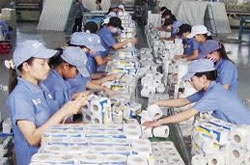Paper firms ink deals
 |
| illustration photo |
The strategic partners declined to reveal the exact amount of capital, but confirmed technical training and transfer as well as financial management enhancement for the local paper producer were on the table.
Yasushi Nishikawa, Daio Paper director of planning, said: “Daio Paper has spent six months studying Saigon Paper just to make sure that we are going to work well with each other in the future.
The partnership also shows our commitment to improving and developing Vietnam’s paper market with the right partner and high-tech production facilities.”
Daio Paper and Development Bank of Japan have also considered increasing their stake in Saigon Paper in the near future.
Saigon Paper is to operate modern production lines for tissue and carton products from the third quarter of this year at its second factory in My Xuan A Industrial Park in Ba Ria-Vung Tau province.
With total capital investment of $95.6 million, My Xuan II factory has annual output of 35,000 tonnes of tissue, 140,000 tonnes of cartons and other products. The company’s current My Xuan I paper factory and the second facility will enable Saigon Paper to triple its production capacity.
Saigon Paper sells most of its products via 150 distributors and more than 50,000 points of domestic retail sales. It also exports tissue products to markets worldwide.
Established in 1998, Saigon Paper targets revenue of VND4 trillion (over $191 million) by 2015 and holds market shares of 40 per cent for the tissue market and 15 per cent for the industrial paper segment in Vietnam.
According to the Vietnamese Pulp & Paper Association, the tissue sector was enjoying a healthy growth rate, but from a very low base. Vietnamese people consume only around one kilogramme per person each year.
Cao Tien Vi, chairman of Saigon Paper, said: “Tissue demand, in fact, is a kind of essential demand, and over the last three years, including the global economic turbulence time in 2008-2009, the tissue demand was still growing. In 2011, the growth pace of Vietnam tissue market will be kept on and until 2015, if there are no new investments, then tissue production capacity will be deficient compared to growing demand. The per capita consumption as well as the variety of product categories are all very low here.”
Daio Paper recently also unveiled its 85 per cent stake in the joint venture with Thai firm Saha Pathanapibul to produce and market baby diaper products in South East Asia. The joint venture, called Elleair International, will operate a converting plant in Rayong, Thailand. Construction of the $37 million facility will start this year and it is expected to be up and running by early 2012.
As one of Japan’s top paper manufacturers, Daio Paper operates 38 consolidated subsidiaries and has annual mill capacity of more than 3 million tonnes.
What the stars mean:
★ Poor ★ ★ Promising ★★★ Good ★★★★ Very good ★★★★★ Exceptional
Related Contents
Latest News
More News
- State corporations poised to drive 2026 growth (February 03, 2026 | 13:58)
- Why high-tech talent will define Vietnam’s growth (February 02, 2026 | 10:47)
- FMCG resilience amid varying storms (February 02, 2026 | 10:00)
- Customs reforms strengthen business confidence, support trade growth (February 01, 2026 | 08:20)
- Vietnam and US to launch sixth trade negotiation round (January 30, 2026 | 15:19)
- Digital publishing emerges as key growth driver in Vietnam (January 30, 2026 | 10:59)
- EVN signs key contract for Tri An hydropower expansion (January 30, 2026 | 10:57)
- Vietnam to lead trade growth in ASEAN (January 29, 2026 | 15:08)
- Carlsberg Vietnam delivers Lunar New Year support in central region (January 28, 2026 | 17:19)
- TikTok penalised $35,000 in Vietnam for consumer protection violations (January 28, 2026 | 17:15)

 Tag:
Tag:




















 Mobile Version
Mobile Version